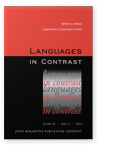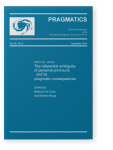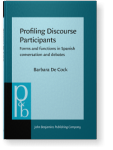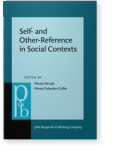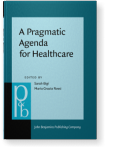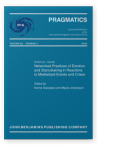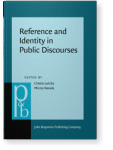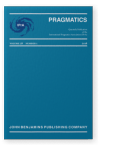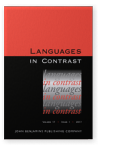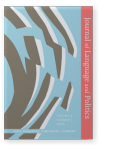Barbara De Cock
List of John Benjamins publications for which Barbara De Cock plays a role.
Journal
Titles
The referential ambiguity of personal pronouns and its pragmatic consequences
Edited by Barbara De Cock and Bettina Kluge
Special issue of Pragmatics 26:3 (2016) ca. 150 pp.
Subjects Discourse studies | Pragmatics
Hearer-Orientation in Spoken Genres
Edited by Bert Cornillie and Barbara De Cock
Special issue of Spanish in Context 12:1 (2015) vi, 176 pp.
Subjects Discourse studies | Pragmatics | Romance linguistics
Profiling Discourse Participants: Forms and functions in Spanish conversation and debates
Barbara De Cock
[Pragmatics & Beyond New Series, 246] 2014. xvii, 307 pp.
Subjects Discourse studies | Pragmatics | Romance linguistics
2024 Chapter 3. Self-reference as an argumentative tool: Discourse by politicians and experts during the Covid-19 pandemic Self- and Other-Reference in Social Contexts: From global to local discourses, Nevala, Minna and Minna Palander-Collin (eds.), pp. 39–61 | Chapter
In this chapter, we analyse how politicians and experts from Belgium, the Netherlands and Spain involved in the Covid-19 crisis construct self-reference on Twitter (currently X), combining linguistic approaches to person reference and argumentation theory. On the one hand, we show that uses are… read more
2023 Chapter 12. Peer experts as actors for shared understanding in Spanish online health fora A Pragmatic Agenda for Healthcare: Fostering inclusion and active participation through shared understanding, Bigi, Sarah and Maria Grazia Rossi (eds.), pp. 291–312 | Chapter
In this study, we compare how ‘peer experts’, understood as lay users who have achieved expertise and credibility on a particular health condition through personal experience (Vydiswaran and Reddy 2019), fulfill a bridging function by creating shared understandings on patient fora on diabetes vs… read more
2020 Any #JesuisIraq planned?*: Claiming affective displays for forgotten places Networked Practices of Emotion and Stancetaking in Reactions to Mediatized Events and Crises, Giaxoglou, Korina and Marjut Johansson (eds.), pp. 201–221 | Article
The stem #jesuis followed by a toponym (e.g. #jesuisParis) has proved to be very productive in the gathering of affective publics (Papacharissi 2015) around causes of mourning, after terrorist attacks and other disasters. However, not all attacks have given rise to such massive affective use of… read more
2019 To be or not to be … a patient: Identity construction of healthcare professionals and patients in public online diabetes-related interaction Reference and Identity in Public Discourses, Lutzky, Ursula and Minna Nevala (eds.), pp. 205–225 | Chapter
This study offers an analysis of medical and emotional identity features put forward by participants asking questions and providing answers in three types of public online diabetes-related interaction in Spanish (frequently asked questions, chat sessions and fora). The results show that many… read more
2018 ¿Quién atenúa y cuándo en español? La atenuación en función del género discursivo Estrategias atenuantes en géneros discursivos del español: Interfaz semántico-pragmática, Albelda Marco, Marta (ed.), pp. 305–324 | Article
En este análisis, abordamos la atenuación en español desde la variación entre géneros discursivos orales (conversaciones, interacciones en clase, debates parlamentarios y entrevistas sociolingüísticas). Basándonos en el análisis de Briz (2007) de la atenuación en conversaciones informales y… read more
2018 Taboo effects at the syntactic level: Reducing agentivity as a euphemistic strategy Pragmatics 28:1, pp. 113–138 | Article
This paper analyses the linguistic resources used by speakers to profile the participants in taboo actions, focusing on expressions for the concept abortar 'to abort' in Spanish sociolinguistic interviews. The tokens referring to the action are analysed in terms of linguistic features that… read more
2017 The pragmatics of person reference: A comparative study of Catalan and Spanish parliamentary discourse Languages in Contrast 17:1, pp. 96–127 | Article
In this article, we show through a contrastive analysis of person reference in Catalan and Spanish parliamentary discourse, that it is paramount to take into account not only syntactic but also pragmatic factors in order to adequately analyse the differences between two languages that have… read more
2016 Register, genre and referential ambiguity of personal pronouns: A cross-linguistic analysis The referential ambiguity of personal pronouns and its pragmatic consequences, De Cock, Barbara and Bettina Kluge (eds.), pp. 361–378 | Article
This paper argues for revisiting the traditional adscription of ambiguous readings of personal pronouns, such as hearer-dominant we or generic you, pluralis maiestatis and pluralis modestiae to specific genres and/or registers. Indeed, in many languages these phenomena are considered typical for a… read more
2016 On the referential ambiguity of personal pronouns and its pragmatic consequences The referential ambiguity of personal pronouns and its pragmatic consequences, De Cock, Barbara and Bettina Kluge (eds.), pp. 351–360 | Article
2015 Ways of encoding attention to the interlocutor in contemporary spoken Spanish Hearer-Orientation in Spoken Genres, Cornillie, Bert and Barbara De Cock (eds.), pp. 1–9 | Article
The papers in this volume examine how Spanish speakers express attention to their interlocutors (or co-participants) verbally. It is now generally accepted that subjective expressions have interactional functions, encouraging the flow of discussion and creating cohesive discourse and that there are… read more
2015 Subjectivity, intersubjectivity and non-subjectivity across spoken language genres Hearer-Orientation in Spoken Genres, Cornillie, Bert and Barbara De Cock (eds.), pp. 10–34 | Article
Various authors have pointed out a relationship between (inter)subjectivity and spoken language. This article looks into the relationship between subjectivity, intersubjectivity, non-subjectivity and spoken discourse genres in a more detailed way. On the basis of a quantitative and qualitative… read more
2006 The European Union and the Organisation Internationale de la Francophonie: Organisations on a joint mission or friendly opponents? Journal of Language and Politics 5:3, pp. 385–413 | Article
The EU and the OIF have both developed to become international organisations that combine economic, geopolitical and cultural-linguistic policies. This article deals with the fascinating interface of such policies. The main focus resides on the discourse by which both organisations construct their… read more
